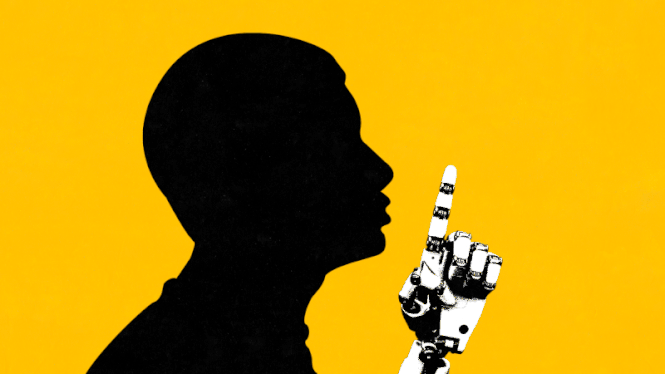What If Your ChatGPT Transcripts Leaked?
Data collection is once again at the forefront of a new technology.

This is Atlantic Intelligence, a newsletter in which our writers help you wrap your mind around artificial intelligence and a new machine age. Sign up here.
Shortly after Facebook became popular, the company launched an ad network that would allow businesses to gather data on people and target them with marketing. So many issues with the web’s social-media era stemmed from this original sin. It was from this technology that Facebook, now Meta, would make its fortune and become dominant. And it was here that our perception of online privacy forever changed, as people became accustomed to various bits of their identity being mined and exploited by political campaigns, companies with something to sell, and so on.
AI may shift how we experience the web, but it is unlikely to turn back the clock on the so-called surveillance economy that defines it. In fact, as my colleague Lila Shroff explained in a recent article for The Atlantic, chatbots may only supercharge data collection.
“AI companies are quietly accumulating tremendous amounts of chat logs, and their data policies generally let them do what they want. That may mean—what else?—ads,” Lila writes. “So far, many AI start-ups, including OpenAI and Anthropic, have been reluctant to embrace advertising. But these companies are under great pressure to prove that the many billions in AI investment will pay off.”
Ad targeting may be inevitable—in fact, since Lila wrote this article, Google has begun rolling out related advertisements in some of its AI Overviews—but there are other issues to contend with here. Users have long conversations with chatbots, and frequently share sensitive information with them. AI companies have a responsibility to keep those data locked down. But, as Lila explains, there have already been glitches that have leaked information. So think twice about what you type into that text box: You never know who’s going to see it.

Shh, ChatGPT. That’s a Secret.
By Lila Shroff
This past spring, a man in Washington State worried that his marriage was on the verge of collapse. “I am depressed and going a little crazy, still love her and want to win her back,” he typed into ChatGPT. With the chatbot’s help, he wanted to write a letter protesting her decision to file for divorce and post it to their bedroom door. “Emphasize my deep guilt, shame, and remorse for not nurturing and being a better husband, father, and provider,” he wrote. In another message, he asked ChatGPT to write his wife a poem “so epic that it could make her change her mind but not cheesy or over the top.”
The man’s chat history was included in the WildChat data set, a collection of 1 million ChatGPT conversations gathered consensually by researchers to document how people are interacting with the popular chatbot. Some conversations are filled with requests for marketing copy and homework help. Others might make you feel as if you’re gazing into the living rooms of unwitting strangers.
What to Read Next
- It’s time to stop taking Sam Altman at his word: “Understand AI for what it is, not what it might become,” David Karpf writes.
- We’re entering uncharted territory for math: “Terence Tao, the world’s greatest living mathematician, has a vision for AI,” Matteo Wong writes.
P.S.
Meta and other companies are still trying to make smart glasses happen—and generative AI may be the secret ingredient that makes the technology click, my colleague Caroline Mimbs Nyce wrote in a recent article. What do you think: Would you wear them?
— Damon
What's Your Reaction?




















